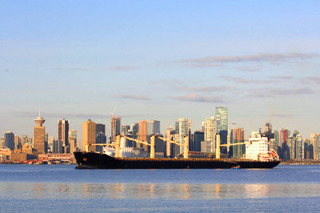An “idea jam” that took place last Friday sought out-of-the-box solutions for affordable housing
Idea Jam Kicks Off Vancouver’s re:THINK HOUSING
Laura Rodgers
Van. Courier

Could housing people in container ships off Vancouver’s coastline solve the city’s affordable housing crisis?
An “idea jam” that took place last Friday sought to test out the idea, and other out-of-the-box solutions from the mundane to the wacky. The event, attended by city officials, developers and creative types, involved nine groups cobbling together proposals to try and fix Vancouver’s housing problem.
A handful of people, including Vancouver assistant director of housing policy Abi Bond, sketched out a plan to transform a cargo ship into a green-roofed utopia. They proposed a kayak co-op for commuting to and from the shore, filtered seawater to drink, and occasional rotation of the hull so the container-homes on both sides could get southern exposure.
Other suggestions ranged from tweaking property tax laws to building tiny apartments atop warehouses. The prevailing attitude seemed to be that the current crunch in the least affordable city in North America was caused not by a lack of housing supply, but by a dearth of creativity.
“There’s some really thought-provoking work here that’d be useful for city hall,” said Mayor Gregor Robertson, who attended the city-sponsored event at the HiVe on West Hastings. “A couple of groups that had [ideas about] ‘float houses’ and ‘ship living’ which [are] kind of way outside the box—offshore affordable housing?…There may be an opportunity for more [housing] in the water.”
Robertson said zoning and taxation are a challenge. “There have been ideas around reforming the property transfer tax, creating more incentives for co-op housing… but unfortunately we don’t control the levers on those [taxes] at city hall.”
The event was intended to be a jumping-off point for the city’s “re:THINK HOUSING” contest, which offers cash prizes of up to $3,000 for the best novel housing strategies. Entries, which must be submitted by June 29, will be judged by a jury of urban-planning experts.
One group proposed eliminating property tax on any improvements to land. Another brought forward the idea of marketing an iPhone app—which, for some reason, involved squirrels—where players win a game if they minimize housing costs.
The event crackled with energy, but some attendees doubted if a single evening of brainstorming could realistically effect change.
“As much as it’s exciting, and a publicity stunt, I think there are a lot of people here who are not professionals, who don’t have a real finger on the pulse as far as what’s really needed,” said attendee and aspiring urban planner Andrew Martin.
Freelance architect Mitra Mansour questioned the effectiveness of soliciting ideas on a volunteer basis, outside of participants’ regular working hours. “Great ideas come out… but some of the ideas that get thrown around—because we’re too busy being slaves to our day jobs—don’t get fully realized.”
Mansour nonetheless praised the event’s openness, comparing it favourably to similar gatherings such as the Vancouver Urban Forum, which charged $249 for one day’s admission.
Still, Robertson is hopeful that the mostly young crowd in attendance will continue to push for change. “When you have a roomful of people that I expect have far more housing challenges than most Vancouverites… they’ll be a force to contend with, lobbying for change that gets them into housing” said Robertson.
© Copyright (c) Vancouver Courier